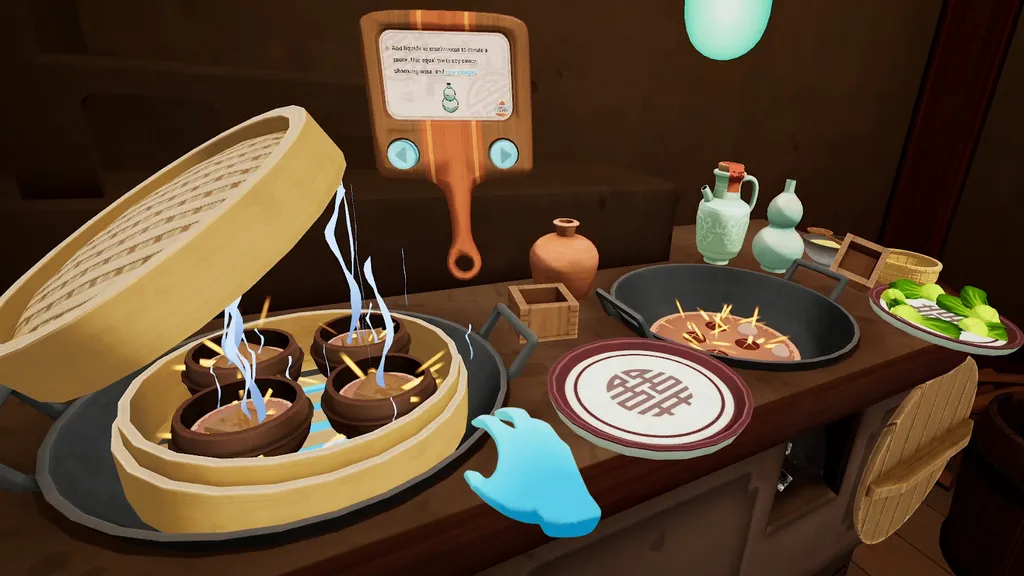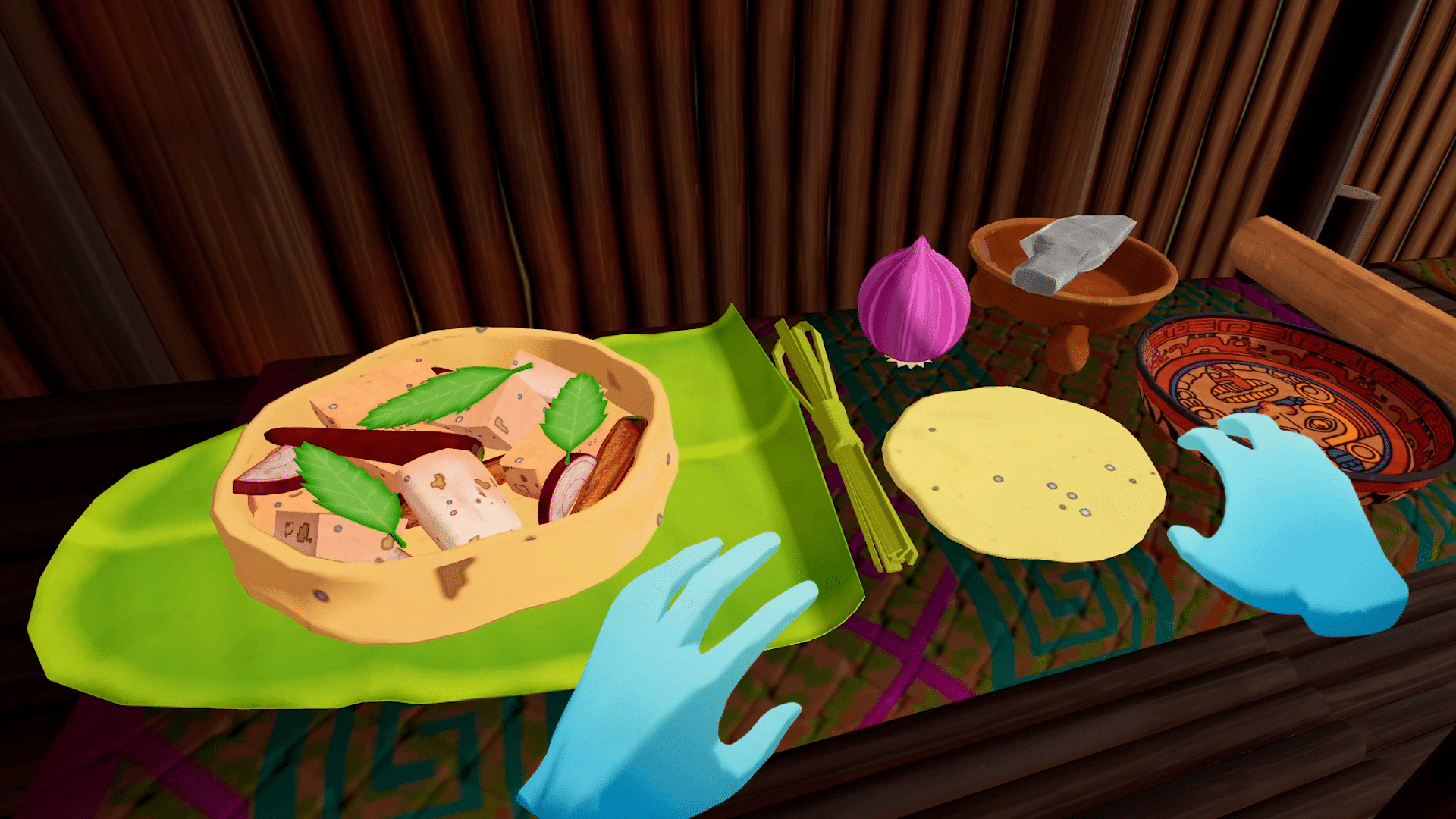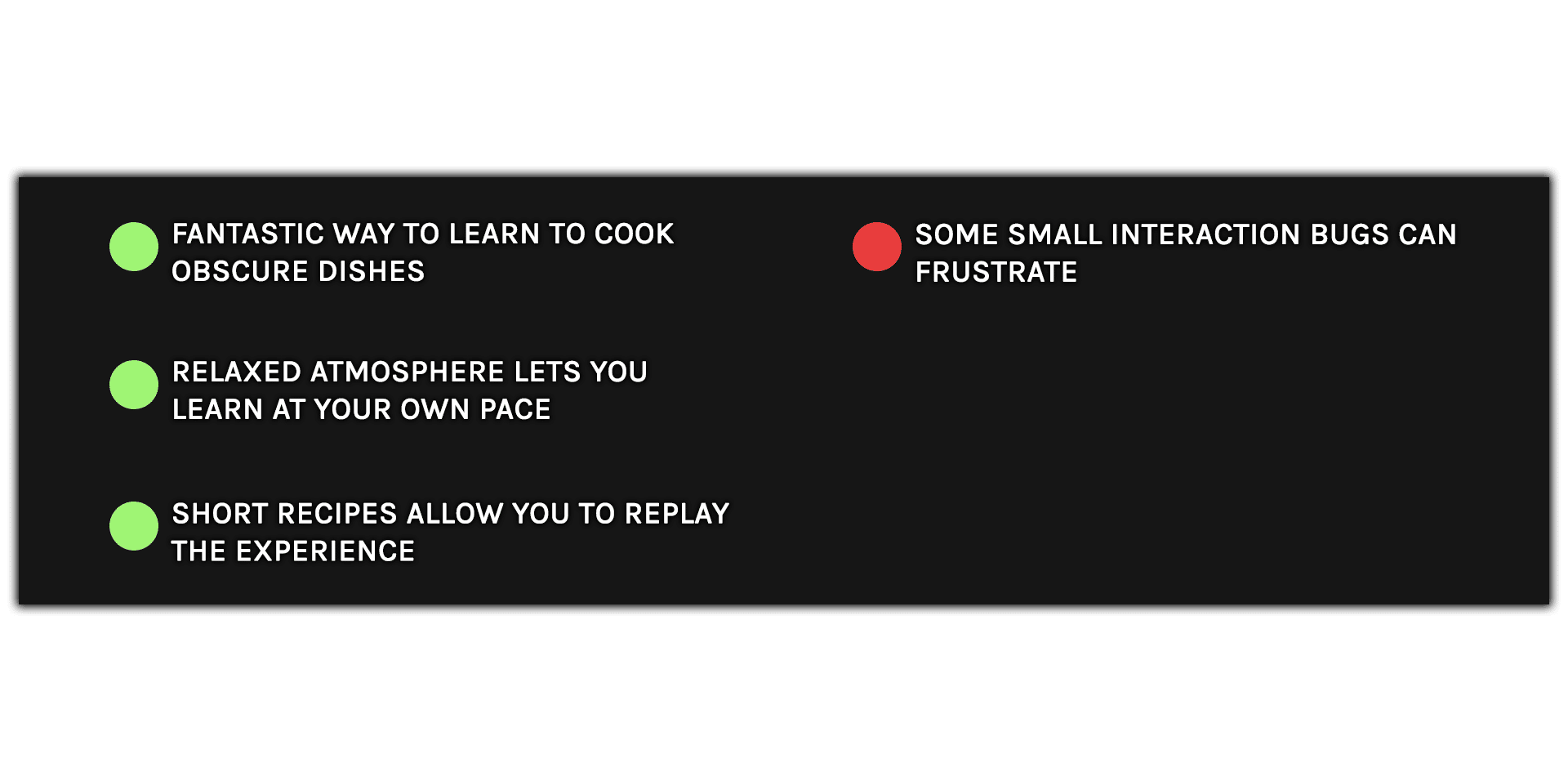Lost Recipes aims to strike a balance between engaging VR gameplay and educational cooking simulator – but does it find the right mix of ingredients, or does it all go up in flames? Read on for our Lost Recipes review.
Turning the Tables
Cooking can be a notoriously frantic activity, especially for those who are new to the kitchen or juggling many things at once. This frantic chaos is often what game developers choose to focus on in cooking games – getting things done under pressure, completing complex orders and going for quantity over quality.
Lost Recipes, developed by Schell Games, flips this trend on its head, offering something more intentionally slow-paced, almost meditative and quite educational. It’s a refreshing take that provides an experience that is entertaining, but also using virtual reality to present a new form of cooking education. What’s most impressive about Lost Recipes is that the skills and processes you learn aren’t just applicable to the game – you can bring them back into a real life kitchen as well.
[vc_row][vc_column][vc_cta h2=””]Lost Recipes VR Review – The Facts
What is it?: A VR cooking game that focuses on taking your time and teaching you recipes from ancient cultures.
Platforms: Meta Quest
Release Date: January 27th
Price: $14.99[/vc_cta][/vc_column][/vc_row][vc_row][vc_column][vc_column_text]
Refreshing is the word I keep coming back to with this game – not only is it a refreshing style of game, but it’s also an intentionally short experience that doesn’t overstay its welcome. In the current games-as-a-service, ongoing content market, it’s nice that Lost Recipes knows its limits and executes a simple idea within them.
Schell Games says that Lost Recipes was developed in conjunction with subject matter experts for each historical culture represented in the game, and this brings a real authentic feel to the entire experience. You will work your way through nine recipes in total, each taking around 10-15 minutes max, split across three different cultures, each with a different kitchen and style of food.
[vc_row][vc_column][vc_cta h2=””]Lost Recipes Review – Comfort
Lost Recipes is a super comfortable game — it works roomscale or seated, with teleport options to each section of the kitchen. To move and reposition yourself at each station, you can simply grab onto a ledge and drag yourself around, similar to Echo VR’s grab mechanic. Most users should feel pretty comfortable, as there’s no real artificial movement or locomotion at all.[/vc_cta][/vc_column][/vc_row][vc_row][vc_column][vc_column_text]
Each culture also has a distinct ghost chef spirit, who reads you the recipes and guides you through the experience. These ghost chefs are also voiced by people with ties to each historical culture. You start off in Ancient Greece, then head over to Song Dynasty China and round off the experience in the Yucatan Peninsula.
A Relaxing Distillation
The key to Lost Recipes success is that the gameplay is not a 1:1 simulation of the cooking experience – it is the core fundamentals of each recipe, boiled down into a perfectly-simplified version that stays true and authentic to the process while also ‘gamifying’ it in a way that feels natural. Even so, this is a game with super low amounts of pressure or stress. There’s no timed element to the recipes and no strict requirement to get everything exactly right. The chefs encourage you to take your time and aim for accuracy as opposed to rushing against the clock.
This even extends to how you manage your ingredients and cooking utensils – if something falls on the floor, the chef tells you not to worry and it’s teleported back to the work space. The focus is distinctly pointed at learning the recipes and enjoying your time with them. Just cook, and you’ll probably learn something along the way.
That isn’t to say the game completely lacks objectives or progression – you unlock recipes one by one, and after completing each one you’re given a rating out of 5 stars. However, your rating is given based on how accurate you are to the instructions and the process. On one recipe, I got 4 stars out of 5 and the game simply suggested that my dough might have done better with a bit more olive oil. It’s a non-punishing environment that lets you relax.
In terms of mechanics, there’s balance between giving you freedom to perform some actions in your own way and then also simplifying other actions so that you don’t have to think too hard. For example, when chopping meat into ‘8 equal pieces’, you’re given some flexibility – it’s possible to cut the meat into chunks that are definitely not equal. But when chopping up ‘some ginger’ to put on top of a steamed fish, a chopping action will simply julienne the ginger perfectly no matter where you make the incision.
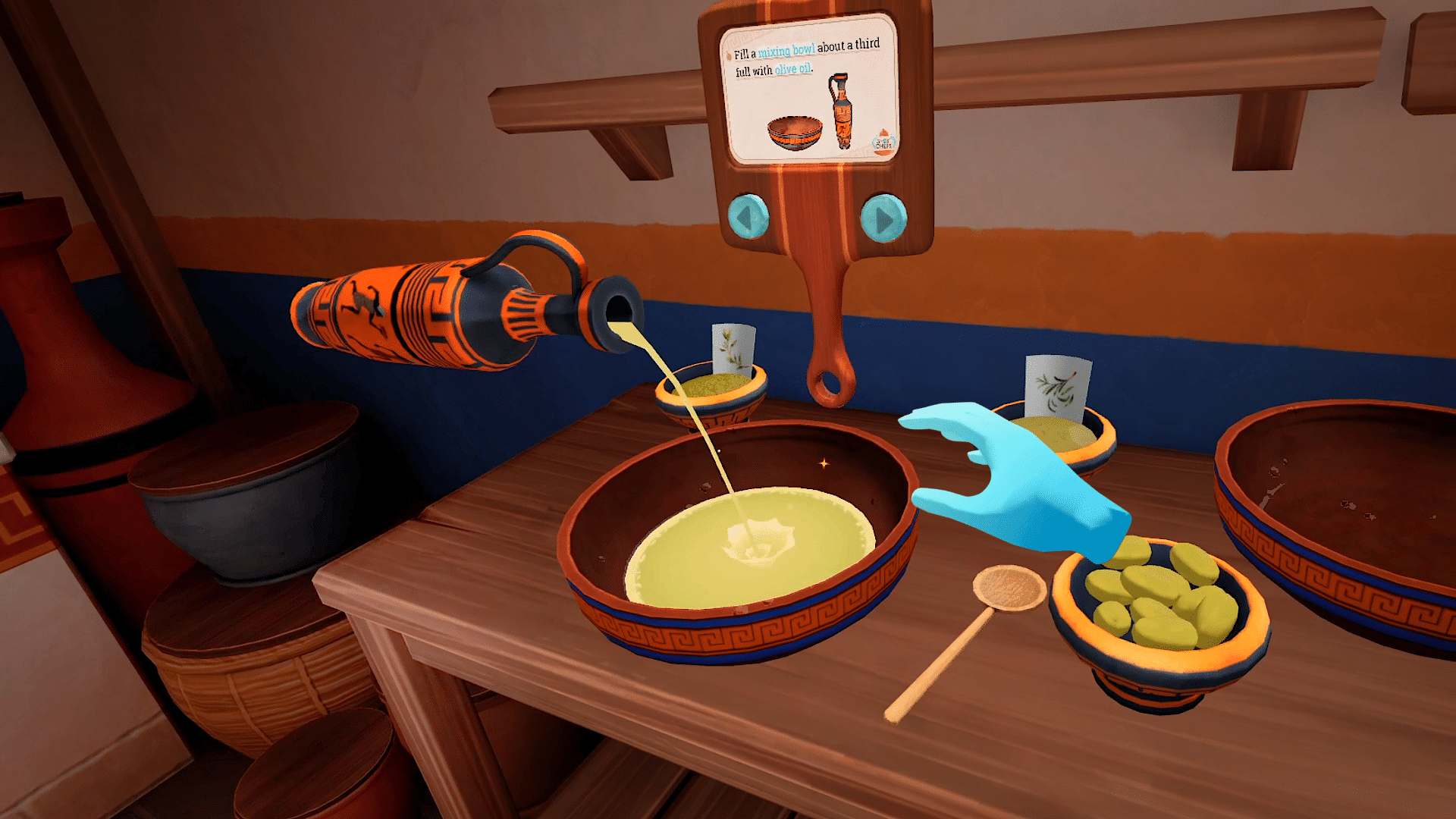
Another hugely successful element of Lost Recipes is how it doesn’t focus on precise amounts or measurements. You’re often told to put “equal amounts” or “a splash” or “a spoon” – the instructions are specific enough that you understand how much to use, but not so specific that you leave the experience worrying about whether it was 50ml or 100ml of wine in the marinade.
Virtual Becomes Reality
In fact, this method is what gives the game credence as an educational tool. The focus on the why, how and when of cooking — and not more specifics on what and how much — means that a lot of these recipes and processes can be easily transferred into your real kitchen at home.
I tried this out for myself — after completing the steamed Chinese fish recipe in game, I realised I had enough ingredients (with some small modifications) to try the recipe out for dinner that night. I ran through the recipe in game one more time, then replicated it as best I could in my own kitchen. I had doubts, but the end result was a spectacularly tasty piece of steamed fish. Before that, I had never steamed fish in an Asian style before in my life – I was amazed that the game had successfully taught me how.
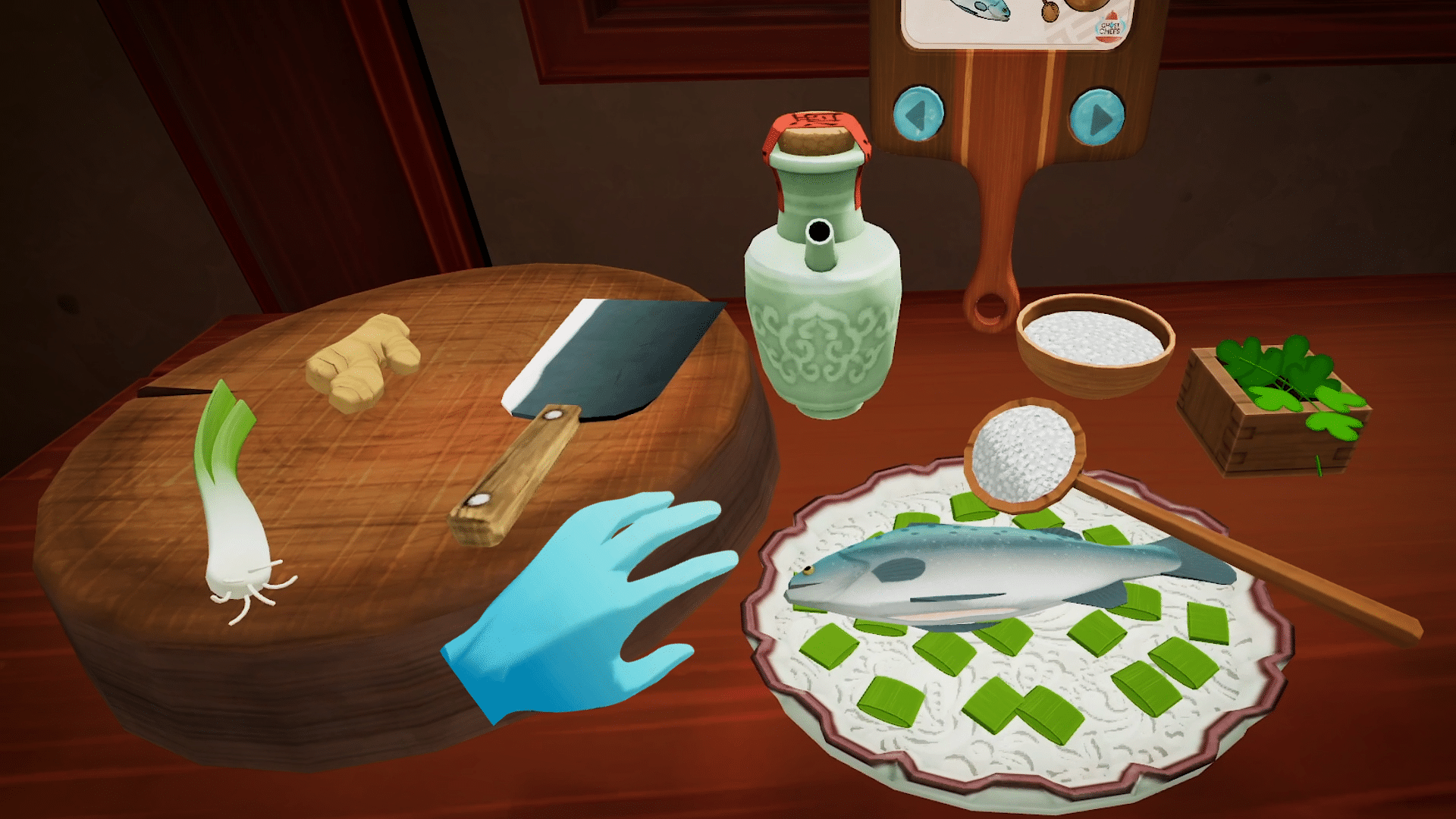
This isn’t to say that the game doesn’t have any shortcomings. There were a few times where I got frustrated at little bugs or quirks of the interaction system. The liquid simulations seemingly ran at a lower framerate, sometimes making it hard to accurately pour or balance items I was carrying. Likewise, there were a few times where I went to pick up a bowl of prepared food, and would find myself picking up one morsel of food instead of the bowl itself. There were a few instances where things flew off in strange directions, clipped through a bench or fell through a surface to the floor. All fairly minimal and manageable frustrations, and certainly not deal breakers.
The experience is short, but it doesn’t feel too short – there’s just enough here to leave you wishing for more, but not left annoyed at the amount you got. You can play through recipes again for improved scores and there’s for 3 save slots as well. Realistically, the game is probably only designed to be played through once, after which you might pass it on to friends or family members. And that’s perfectly okay – not everything needs to provide endless content or a several hour-long campaign. If anything, Lost Recipes is absolutely ripe for a free or paid DLC expansion down the line, and I would be surprised if that’s not on Schell Games’ mind too.
Lost Recipes Review – Final Verdict
What Lost Recipes does best is provide an incredibly immersive way to engage with food culture and learn how to prepare dishes in a way that is relevant today yet also authentic to the process and style of these historical cultures.
Even if you don’t plan on transferring the skills you learn into your own cooking, it’s still an entertaining and educational experience in itself. However, it’s the budding cooks and the established home chefs, willing to learn and take this back into their own kitchens, who will get the most out of Lost Recipes. It’s a completely unique way to learn recipes, let alone those from cultures so far in the past.
Lost Recipes one of the best examples of how we can take something very familiar and use VR to present it in a completely unique and immersive way. What more could we want from this technology, if not a way to engage with cultures from the past and bring something back from that experience into our own lives, carrying traditions forward? That is a truly magical achievement, for which the team at Schell Games should be congratulated. The more nuanced and enriching experiences like Lost Recipes available in VR, the better.

For more on how we arrived at this score, read our review guidelines. What did you make of our Lost Recipes review? Let us know in the comments below!

